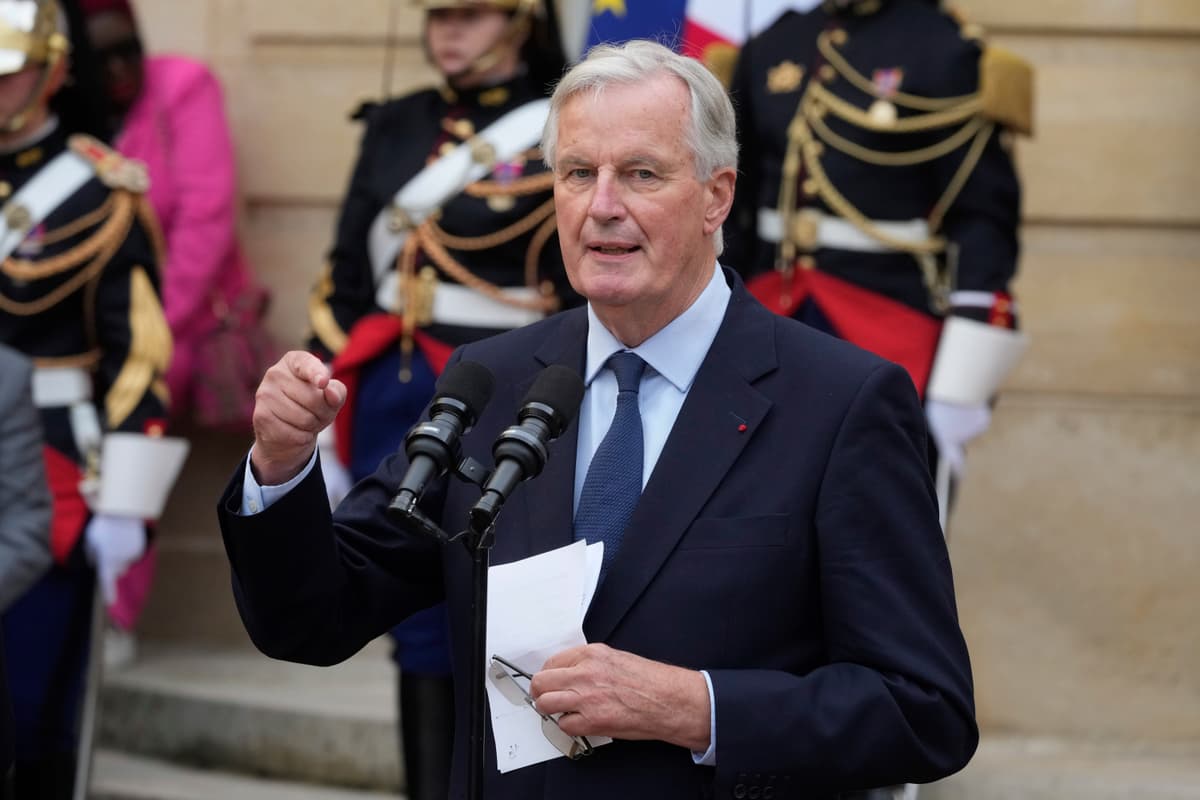La Surprise de Septembre
Is Michel Barnier the right pick for France in the present chaotic circumstances?

Michel Barnier, 73, who was appointed prime minister of France by president Emmanuel Macron yesterday, has been sporting two pins on his lapel, along with his red rosette of an officer of the Legion of Honor, a yellow ribbon in solidarity with the Israeli civilians taken hostage by Hamas, and two crossed flags — the French tricolor and the blue-and-white Israeli flag.
This, whatever else one can say about Mr. Barnier, does not pass for a sign of cowardice or moral confusion in these times. Nor a surprise considering that he stems from Savoie, the pristine Alpine province stretching from the shores of Lake Geneva to the three smaller but no less beautiful lakes of Annecy, Bourget, and Aiguebelette.
Once an independent French-speaking State and the cradle of the House of Savoy that took over the Kingdom of Piedmont-Sardinia and then the Kingdom of Italy, it was united to France in 1860. Savoyards — or Savoisiens, as some of them insist on being called — are routinely depicted as religious, patriotic, and hard-working.
In 1978, aged 27, Mr. Barnier was elected as a Gaullist member of the National Assembly from the Savoie département. Out of Christian convictions, he supported the abolition of the death penalty in 1981, unlike most conservatives, but opposed the further liberalization of abortion laws and the decriminalization of gay relations with minors older than 15.
He has also served as president of the Savoie local council, member of the French Senate, minister of Environment and then of Agriculture. Few French politicians can claim nowadays such a wide experience in domestic affairs.
Europe was, however, to be Mr. Barnier’s true calling. He served successively as minister for European affairs and foreign minister, and then twice as European commissioner. Following Brexit, he was in charge of brokering with the UK a new Euro-British regime. He proved to be a tough business negotiator to his counterparts’ bitter dismay.
Moreover, as a member of the European Parliament and an EU Commissioner, Monsieur Barnier was the master builder of a new European conservative coalition bringing together the Christian Democratic right, originally the backbone of European federalism, and the Gaullist or nationalist right, which insists on keeping European nations sovereign within the EU framework. Only a Savoyard could achieve this.
No doubt President Macron had Mr. Barnier’s different facets in mind when he decided to appoint him to the premiership, with a nearly impossible task: get France out of the political labyrinth created by the European and domestic ballots earlier this year, and even more importantly setting up a moderate political coalition likely to last.
It took Mr. Macron two months — between July 7 and September 5 — to appoint a new prime minister. There was no precedent in the republican history of France for such a protracted delay. Under the Third and Fourth Republics, prime ministers would come and go in quick succession, according to ever-changing parliamentary majorities.
Under the present Fifth Republic, established in 1958, a much more presidential, if not semi-monarchical regime, it is within the head of state’s prerogative to appoint the prime minister of his choice. Here again, things are supposed to proceed without delay.
If the president holds an absolute or relative majority in the National Assembly, he fully exercises his prerogative and appoints the individual he deems most suitable, regardless of whether he or she is a member of parliament. If the Assembly is dominated by his opponents (a situation known as “cohabitation” in French political jargon), he picks one of them, usually their recognized leader.
However, what about a third situation: no majority at all at the National Assembly? The July 7 legislative ballot has led to this charade. The New Popular Front, a leftwing coalition, won 182 seats out of 577 ; Ensemble, a Macronist coalition, came second with 168 seats ; the rightwing National Rally is third, with 143 seats; and last but not least, the classic conservatives, rebranded as the Democratic Right, garnered 46 seats.
The New Popular Front stridently claimed to impose Lucie Castets, an obscure Socialist civil servant at Paris City Hall, for premier: in order to implement a near Venezuelan platform. That was a non-starter.
The only alternative was to establish a centrist majority that would include, along with the Macronists, the moderate conservatives and one half at least of the left. There was a shortlist for prime ministers in this respect. On the right, Xavier Bertrand, president of the Northern France region, was frequently mentioned. On the left, Bernard Cazeneuve, a former socialist prime minister.
However, the National Rally threatened to table a motion of no confidence against both names. Possibly with the support of the radical left. Evidently, the only person that could bring the intended coalition together without antagonizing the National Rally was Monsieur Barnier.
He is exceptionally well-positioned to turn an emergency, half-improvised majority into a lasting governing majority. With a simple and feasible pattern to follow: The “Great Coalition” of Christian-democrats, conservatives, and social-democrats that dominate the recently elected European Parliament as well as the European Commission.

